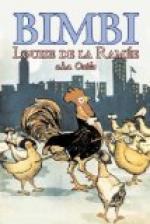Were people so much kinder five centuries before, he wondered, and felt sad as the many-colored robes swept on through the grass, and the crack of the rifles sounded sharply through the music of the chanting voices. He went on footsore and sorrowful, thinking of the castle doors that had opened, and the city gates that had unclosed, at the summons of the little long-haired boy whose figure was painted on the missal.
He had come now to where the houses were much more numerous, though under the shade of great trees,—lovely old gray houses, some of wood, some of stone, some with frescos on them and gold and color and mottoes, some with deep barred casements, and carved portals, and sculptured figures; houses of the poorer people now, but still memorials of a grand and gracious time. For he had wandered into the quarter of St. Nicholas in this fair mountain city, which he, like his country-folk, called Sprugg, though the government calls it Innspruck.
He got out upon a long gray wooden bridge, and looked up and down the reaches of the river, and thought to himself, maybe this was not Sprugg but Jerusalem, so beautiful it looked with its domes shining golden in the sun, and the snow of the Soldstein and Branjoch behind them. For little Findelkind had never come so far as this before. As he stood on the bridge so dreaming, a hand clutched him, and a voice said:—
“A whole kreutzer, or you do not pass!”
Findelkind started and trembled.
A kreutzer! he had never owned such a treasure in all his life.
“I have no money,” he murmured timidly; “I came to see if I could get money for the poor.”
The keeper of the bridge laughed.
“You are a little beggar, you mean? Oh, very well! Then over my bridge you do not go.”
“But it is the city on the other side?”
“To be sure it is the city; but over nobody goes without a kreutzer.”
“I never have such a thing of my own! never! never!” said Findelkind, ready to cry.
“Then you were a little fool to come away from your home, wherever that may be,” said the man at the bridge-head. “Well, I will let you go, for you look a baby. But do not beg; that is bad.”
“Findelkind did it!”
“Then Findelkind was a rogue and a vagabond,” said the taker of tolls.
“Oh, no—no—no!”
“Oh, yes—yes—yes, little sauce-box; and take that,” said the man, giving him a box on the ear, being angry at contradiction.
Findelkind’s head drooped, and he went slowly over the bridge, forgetting that he ought to have thanked the toll taker for a free passage. The world seemed to him very difficult. How had Findelkind done when he had come to bridges?—and, oh, how had Findelkind done when he had been hungry?
For this poor little Findelkind was getting very hungry, and his stomach was as empty as was his wallet.
A few steps brought him to the Goldenes Dachl.




